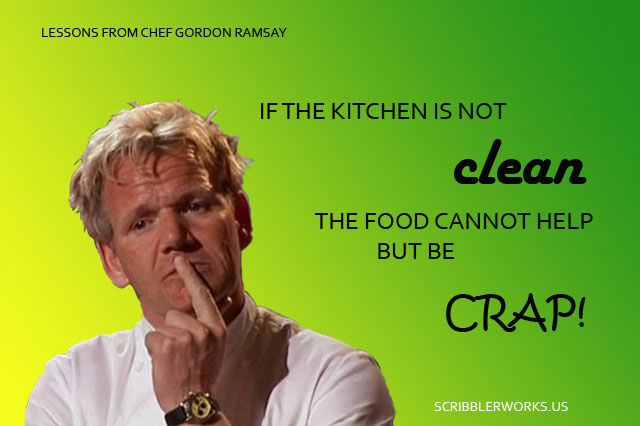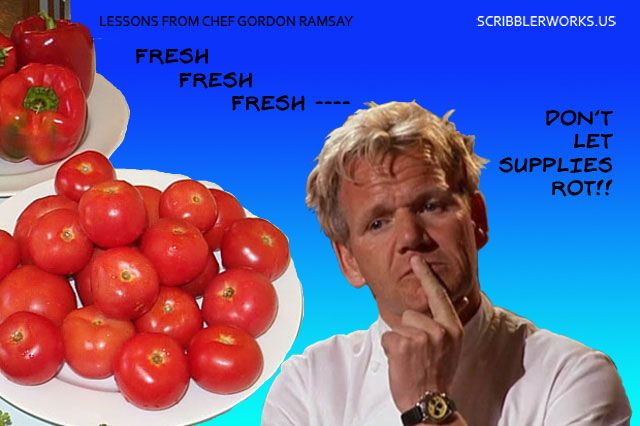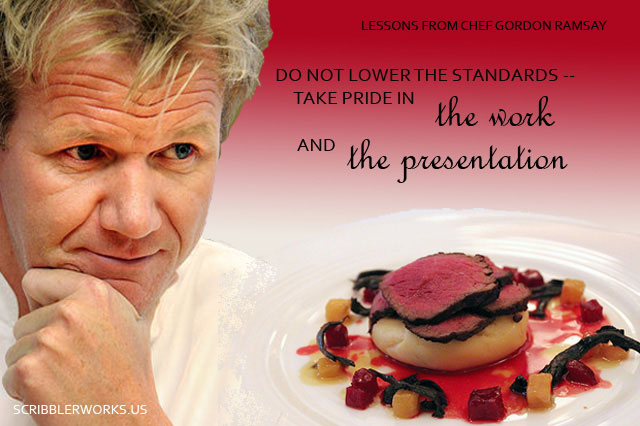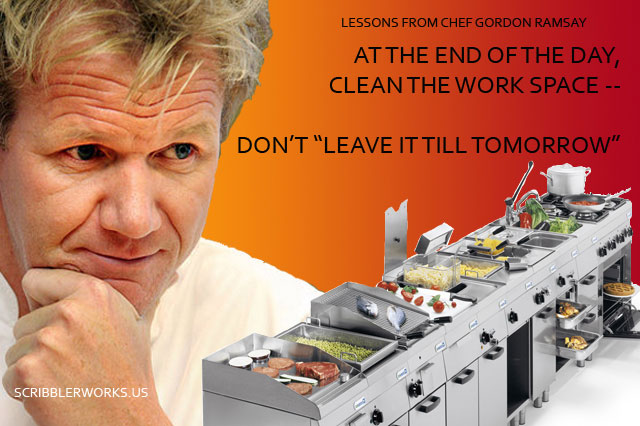During my time in Oregon, I got into watching a lot of Gordon Ramsay’s shows on Hulu (Kitchen Nightmares, Hell’s Kitchen, Master Chef, even the British version of The F Word (“F” meaning “food,” in case you didn’t know)). Hulu had multiple seasons of the shows, so I definitely binge-watched the programs. I found him very intriguing. But the more I watched, the more I noticed that there are certain principles that he holds to for cooking and running a restaurant that make for good metaphors about how we should approach our life and work.
Keep It Clean
The first one, which shows up in many, many episodes of Kitchen Nightmares, deals with the state of the work space.
 How can this apply outside of the kitchen, though? I mean, it certainly makes sense inside the kitchen, because the residue of past grime getting into the current food preparation. But what about other areas of activity?
How can this apply outside of the kitchen, though? I mean, it certainly makes sense inside the kitchen, because the residue of past grime getting into the current food preparation. But what about other areas of activity?
There’s an on-going debate about messy-desk versus clean-desk, and the effect it can have on the quality of the worker. As one who often has let my home desk get cluttered, I’ve been willing to join the party of “Messy Desks are a Sign of Intelligence.” But the fact of the matter is that clutter often made working difficult, because I didn’t have enough space to have all my resources available. Did that make my work “crap”? Not necessarily, but it didn’t help.
Fresh, Fresh, Fresh
The second principle Chef Ramsay often mentions is making sure you are working with fresh ingredients.
 In particular on Kitchen Nightmares, Ramsay would be appalled by food that had been allowed to rot in the back corners of walk-in refrigerators. One shudders to think of the toxins that can get into food made with rotting ingredients. But again, how do you take this principle beyond the kitchen?
In particular on Kitchen Nightmares, Ramsay would be appalled by food that had been allowed to rot in the back corners of walk-in refrigerators. One shudders to think of the toxins that can get into food made with rotting ingredients. But again, how do you take this principle beyond the kitchen?
For artists, at least, this point combined with the first one, makes a lot of sense. You want to keep your paint brushes and work surfaces (whether paper or canvas) clean. Dirty paints are no help at all, as well. In offices that have to generate paperwork, they certainly don’t want grimy paper for official documents. If you are sewing clothes, you definitely do not want to work with dirty fabrics. The advice sounds like plain common sense, but it’s easy enough to get lackadaisical about keeping work materials in their best conditions.
Keep It Simple
One of the things that Chef Ramsay has to tell various contestants on Hell’s Kitchen is that the aspiring chef has over-complicated the dish they are presenting. If one element of the dish is supposed to be the “hero” of the dish, he’ll tell them not to over-whelm it with too many other distracting factors.
 In one episode of Hell’s Kitchen, the contestants were to create an “amuse-bouche” – an edible treat that is a surprising taste in one bite. And the “one bite” aspect is a crucial element. Yet one contestant came up and when describing his offering, went through a rather long list of the things he had added to that “one bite” – to the point where just when you thought he was done, he added another two or three elements to the list. It was, basically, the farthest thing from “simple.”
In one episode of Hell’s Kitchen, the contestants were to create an “amuse-bouche” – an edible treat that is a surprising taste in one bite. And the “one bite” aspect is a crucial element. Yet one contestant came up and when describing his offering, went through a rather long list of the things he had added to that “one bite” – to the point where just when you thought he was done, he added another two or three elements to the list. It was, basically, the farthest thing from “simple.”
As a writer who went through my own “purple prose” period, I had to learn the hard way that keeping things simple is the best way to tell the story. By “simple,” I don’t mean bland and boring, but rather most immediate and direct. Emotional impact comes not through complicated, twisting sentences that make you wonder where they will end, but rather by aiming straight for the heart. I’m sure this holds true for other areas of endeavor as well. Music that is over-complicated to the point where you cannot tell where it is going is mere noise.
Let the “hero” of your work shine.
Take Pride in Your Work
One of the things that shows up time and again on Hell’s Kitchen, when the teams are doing a dinner service, is Chef Ramsay’s insistence on high standards of food preparation and presentation.
 Chef Ramsay frequently reminds the chefs about, both on Hell’s Kitchen and on Kitchen Nightmares, is the importance of keeping high standards. But he takes it a step further than simply having high standards for the quality of the cooking and presentation. He urges people to take pride in their work, that if they are pleased with what they have done, they will also take care in giving it the best presentation possible. You don’t love something and then slap it down in front of someone while it looks ugly or messy.
Chef Ramsay frequently reminds the chefs about, both on Hell’s Kitchen and on Kitchen Nightmares, is the importance of keeping high standards. But he takes it a step further than simply having high standards for the quality of the cooking and presentation. He urges people to take pride in their work, that if they are pleased with what they have done, they will also take care in giving it the best presentation possible. You don’t love something and then slap it down in front of someone while it looks ugly or messy.
There’s a big difference between taking pride in the high quality of your work and having the egotism to think that everything you do is automatically perfect. The problem with thinking everything you do is perfect is that you have no standard to measure it against. Your satisfaction with the work depends only on your own feeling about it: if you’re content, that’s enough for everybody, right? Well, no. As an editor, I’ve encountered writers who think they don’t need an editor (not any of my clients, thankfully). But when I look at their prose, I often find that not only do they need an editor, they need to run the spell-check and have a proof-reader.
Having objective standards to evaluate your work is a good thing. It gives you a target to aim for, and you can actually measure how close you are getting to hitting the bull’s eye. But also, taking pride in the work and how you present it means that you are at least hitting the target and not having your arrows bouncing off it.
Clean the Work Space
On Hell’s Kitchen, at the end of a dinner service, you often hear Chef Ramsay telling a team to “clear down” after they have finished serving all their tickets.
 This principle circles back to the first one, about starting in a clean space so the food doesn’t come out crap. But it also addresses a pragmatic factor of human nature. If we leave a mess “until tomorrow,” the chances are that when we face it the next day, we still won’t want to tackle it. Putting off tidying up after you’d done some work, doesn’t help anyone.
This principle circles back to the first one, about starting in a clean space so the food doesn’t come out crap. But it also addresses a pragmatic factor of human nature. If we leave a mess “until tomorrow,” the chances are that when we face it the next day, we still won’t want to tackle it. Putting off tidying up after you’d done some work, doesn’t help anyone.
Of course, this principle easily translates outside of the kitchen. Leaving messes behind oneself helps no one. It gives other people (if there are such around) a bad opinion of you. Coming back to a messy work space the next day can throw your rhythm off for whatever work you have to do. It’s just better all around to clean up after yourself when you finish a job or task. Clean work spaces are more satisfying to come into than messy ones.
Other Principles
There were three other points that occurred to me after watching so many of Chef Ramsay’s programs. But they don’t boil down so well to images. But they are still worth considering.
Do the work with passion.
This easily applies across various work fields, but is especially notable in the creative arts. If the person doesn’t care about what he or she is doing, it shows up in the work. Something is lacking and people often cannot figure out how to pin down what is wrong.
It definitely applies to writing. As Robert Frost once wrote,
No tears in the writer, no tears in the reader. No surprise in the writer, no surprise in the reader.
It is the best thing in the world to love your work and to perform it with that passion of love. It is something to strive for.
Encourage the good work of others.
This principle doesn’t actually affect your work itself, but rather your self-perception. When you do your own work with pride, you have no need to belittle others. Instead, you have the opportunity to encourage others when their work shows excellence. When you are confident in your own work, you are not undercutting yourself by encouraging someone else. Too many people hold back from giving such encouragement, because they fear competition—which betrays a lack of confidence in their own work. Encouraging the good work of others just helps improve the world over-all.
It’s not how you start but how you finish that matters.
Chef Ramsay often says this to people who are struggling to improve. Many people trap themselves in a cycle of depression and frustration by clinging to how badly they did when they started out. Because it is difficult for someone to clearly see how much they are improving, it is easy for them to fall into thinking that improvement isn’t happening at all. But Chef Ramsay constantly tells the contestants on Hell’s Kitchen, “It’s not how you start but how you finish that matters.” Finish strong. Pick yourself up and head for the finish line, no matter what. Don’t be afraid, and don’t worry about how you began. Just do the best in how you finish the work.


